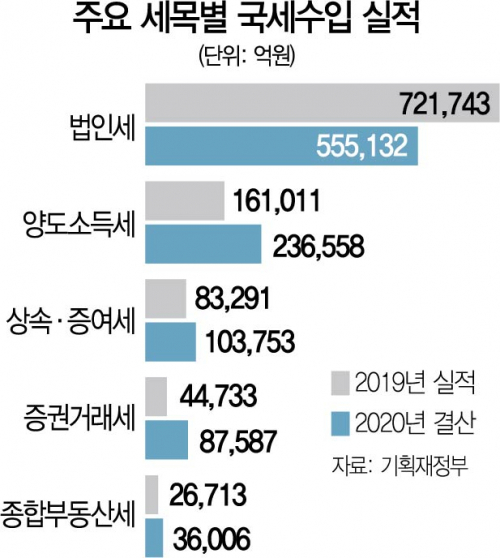[2020 회계연도 총세입·총세출…법인세 16조 급감]
Although the real economy contracted due to corona
House prices rise, real estate taxes are lifted
Securities transaction tax also increased by 95%
Following the increase of the highest income tax rate this year
To compensate for the lack of tax revenue due to the symptoms of wealth
The failure of the Moon Jae-in government’s real estate policy, paradoxically, prevented a tax punk (tax loss).
Last year, corporate tax decreased by more than 16 trillion won in the aftermath of the novel coronavirus infection (Corona 19), but the total national tax revenue decreased by only about 8 trillion won as the capital gains tax increased significantly due to the real estate market and stock market boom. As the highest income tax rate has been raised this year, criticism has emerged that it is trying to make up for the’rich tax’ and lack of tax revenue.
According to the Ministry of Strategy and Finance’s’Fiscal Year 2020 Total Revenue and Total Expenditure Closing Results’, last year’s national tax revenue was 28.5 trillion won, a decrease of 7 trillion 981 billion won (2.7%) from 293 trillion 4543 billion won in 2019. The impact of corporate tax plunging from 72 trillion 1743 billion won to 55 trillion 5132 billion won was significant. The rate of decrease in corporate tax compared to the previous year amounted to 23.1%.
What has prevented a massive’tax punk’ is the boom in the asset market. This is because property-related taxes such as capital gains tax, securities transaction tax, and comprehensive real estate tax were lifted more than expected as house prices rose and real estate and securities transactions increased. Capital gains tax last year was 23,655.8 billion won, an increase of 7,54.7 billion won (46.9%) from the previous year. Last year’s housing transaction volume increased 29% year-on-year to 2.222,000 households, a 35.9% more than the government expected. Securities transaction tax performance reached 8,7587 billion won, an increase of 4,285.4 billion won (95.8%) from the previous year. Securities transaction prices surged 1.5 times, raising 77.5% more than the government expected. Comprehensive real estate tax performance was aggregated to KRW 3.60 trillion, an increase of KRW 9293 billion (34.8%) compared to the previous year due to the increase in public prices. As a result of the increase in inheritance and donations as the government strengthened real estate-related taxation such as acquisition, possession, and transaction, the inheritance and gift tax performance also increased by 2,462 billion won (24.6%) compared to the previous year to 10,375.3 billion won.
 viewer
viewer
 viewer
viewer
Although the real economy contracted due to Corona 19, it is inevitable that the government defended tax revenues with real estate policies. Hong Ki-yong, a professor of business administration at Incheon University, said, “The national income did not increase, but the real estate policy failed, and the real estate price rose, so the tax increased. He criticized him as “abandoning the situation”.
In a situation where tax revenues deteriorate, pressure from the politicians to expenditure is increasing. The 3rd disaster support payment has not been completed, but discussions on the 4th disaster support payment and the formation of an additional budget plan have flowed. With limited tax revenues, there is no choice but to issue deficit government bonds in order to organize an additional budget. Initially, the government predicted that the country’s debt will exceed 1,000 trillion won next year, but if it remains the same, it is possible to exceed 1,000 trillion won this year.
As the highest income tax rate has been raised this year, it is expected that the stance of placing the burden of tax revenue expansion only on high income earners will be strengthened. At the end of last year, the National Assembly handled 15 budget-related bills, including the income tax law, corporate tax law, and comprehensive real estate tax law amendments, which were controversial at the end of last year. As a result, the highest income tax rate was increased to 45%, and the maximum tax rate for comprehensive real estate tax increased to 6%.
Professor Park Hyung-soo of the University of Seoul said, “Now, 10% of high income earners and some large corporations are paying 70-80% of the tax. In the future, we will have to finance welfare and the financial burden will continue to increase. The situation where only Korea’s taxes continue to increase is not sustainable.”
/ Sejong = Reporter Park Hyo-jung [email protected]
< 저작권자 ⓒ 서울경제, 무단 전재 및 재배포 금지 >
